Boconnoc is a civil parish in Cornwall, England, United Kingdom, approximately four miles (6 km) east of the town of Lostwithiel. According to the 2011 census the parish had a population of 96.
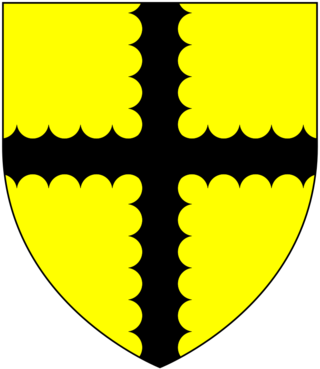
Baron Mohun of Okehampton was a title in the Peerage of England. It was created on 15 April 1628 for John Mohun, formerly a Member of Parliament for Grampound, Cornwall.
The office of High Sheriff of Somerset is an ancient shrievalty which has been in existence since the 11th century. Originally known as the "Sheriff of Somerset", the role was retitled on 1 April 1974, under the provisions of the Local Government Act 1972.

Sir Hugh de Courtenay, 2nd/10th Earl of Devon, 2nd Baron Courtenay, feudal baron of Okehampton and feudal baron of Plympton, played an important role in the Hundred Years War in the service of King Edward III. His chief seats were Tiverton Castle and Okehampton Castle in Devon. The ordinal number given to the early Courtenay Earls of Devon depends on whether the earldom is deemed a new creation by the letters patent granted 22 February 1334/5 or whether it is deemed a restitution of the old dignity of the de Redvers family. Authorities differ in their opinions, and thus alternative ordinal numbers exist, given here.

Margaret de Bohun, Countess of Devon was the granddaughter of King Edward I and Eleanor of Castile, and the wife of Hugh Courtenay, 10th Earl of Devon (1303–1377). Her seventeen children included an Archbishop of Canterbury and six knights, of whom two were founder knights of the Order of the Garter. Unlike most women of her day, she received a classical education and was a lifelong scholar and collector of books.
Margaret Grey was a Cambro-Norman noblewoman, the daughter of Reginald Grey, 3rd Baron Grey de Ruthyn, a powerful Welsh Marcher Lord, who was the implacable enemy of Owain Glyndŵr.

Sir Philip Courtenay of Powderham, Devon, was the senior member of a junior branch of the powerful Courtenay family, Earls of Devon.

Sir Hugh Luttrell, of Dunster Castle in Somerset, feudal baron of Dunster, was an English nobleman and politician, who was an important military officer during the Hundred Years' War. He was a close associate of his cousin, King Richard II of England, and was one of his most valuable advisors. He was also an esquire of John of Gaunt, and an extremely close friend to Queen Anne of Bohemia.

Sir Hugh Courtenay of Boconnoc in Cornwall, was twice a Member of Parliament for Cornwall in 1446–47 and 1449–50. He was beheaded after the Battle of Tewkesbury in 1471, together with John Courtenay, 7th Earl of Devon, the grandson of his first cousin the 4th Earl, and last in the senior line, whose titles were forfeited. His son Edward Courtenay, 1st Earl of Devon, was created Earl of Devon in 1485 by King Henry VII, following the Battle of Bosworth and the closure of the Wars of the Roses.

The Bohun swan, also known as the Bucks Swan, was a heraldic badge used originally in England by the mediaeval noble family of de Bohun, Earls of Hereford, and Earls of Essex.
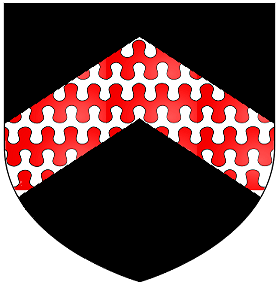
Sir Richard Hankford (1397-1431) was an English landowner and soldier from Devon.

The manor of Wadham in the parish of Knowstone in north Devon and the nearby manors of Chenudestane and Chenuestan are listed in the Domesday Book of 1086:

Sir John Cary, of Devon, was a judge who rose to the position of Chief Baron of the Exchequer (1386–88) and served twice as Member of Parliament for Devon, on both occasions together with his brother, Sir William Cary, in 1363/64 and 1368/69.
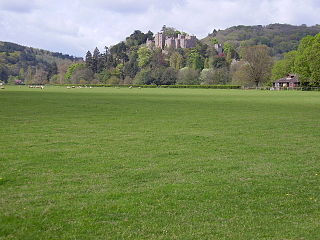
The feudal barony of Dunster was an English feudal barony with its caput at Dunster Castle in Somerset. During the reign of King Henry I (1100–1135) the barony comprised forty knight's fees and was later enlarged. In about 1150 the manors retained in demesne were Dunster, Minehead, Cutcombe, Kilton and Carhampton in Somerset, and Ham in Dorset.
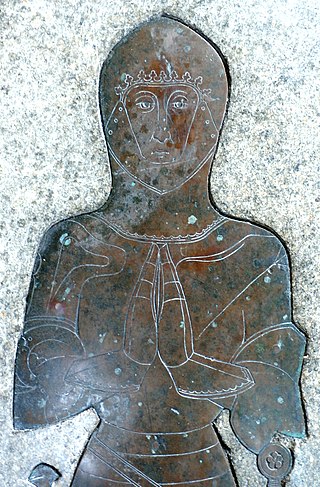
Sir William Wadham (c.1386–1452) of Merryfield in the parish of Ilton, Somerset and Edge in the parish of Branscombe, Devon came from a West Country gentry family with a leaning towards the law, who originally took their name from the manor of Wadham in the parish of Knowstone, between South Molton and Exmoor, north Devon.

Thomas Luttrell, of Dunster Castle in Somerset, feudal baron of Dunster, was a Member of Parliament for his family's newly enfranchised pocket borough of Minehead, from 1563 to 1567. He was Sheriff of Somerset in 1570–1.

John Stourton of Preston Plucknett in Somerset was seven times MP for Somerset, in 1419, 1420, December 1421, 1423, 1426, 1429 and 1435.
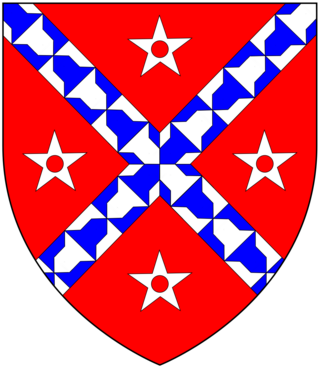
Robert Hill (c.1361–1423) of Spaxton, Somerset was four times MP for Somerset, in 1414 and 1415 jointly with Sir Hugh Luttrell (c.1364–1428) of Dunster Castle, and then in 1416 and 1419.

Sir John Wadham (c.1344–1412) was a Justice of the Common Pleas from 1389 to 1398, during the reign of King Richard II (1377–1399), selected by the King as an assertion of his right to rule by the advice of men appointed of his own choice, and one of the many Devonians of the period described by Thomas Fuller in his Worthies of England, as seemingly "innated with a genius to study law".
Sir Robert I Hill, sometimes written Hull, was an English politician and judge from the West Country.













